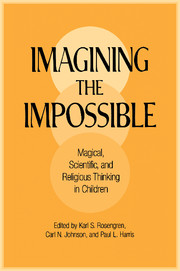Book contents
- Frontmatter
- Contents
- Contributors
- Acknowledgments
- Preface
- 1 The Makings of the Magical Mind: The Nature and Function of Sympathetic Magical Thinking
- 2 Phenomenalistic Perception and Rational Understanding in the Mind of an Individual: A Fight for Dominance
- 3 Metamorphosis and Magic: The Development of Children's Thinking About Possible Events and Plausible Mechanisms
- 4 The Development of Beliefs About Direct Mental-Physical Causality in Imagination, Magic, and Religion
- 5 Intuitive Ontology and Cultural Input in the Acquisition of Religious Concepts
- 6 On Not Falling Down to Earth: Children's Metaphysical Questions
- 7 Putting Different Things Together: The Development of Metaphysical Thinking
- 8 Versions of Personal Storytelling/Versions of Experience: Genres as Tools for Creating Alternate Realities
- 9 The Influence of Religious Beliefs on Parental Attitudes About Children's Fantasy Behavior
- 10 Religion, Culture, and Beliefs About Reality in Moral Reasoning
- 11 Beyond Scopes: Why Creationism Is Here to Stay
- 12 Knowledge Change in Response to Data in Science, Religion, and Magic
- 13 Theology and Physical Science: A Story of Developmental Influence at the Boundaries
- Index
5 - Intuitive Ontology and Cultural Input in the Acquisition of Religious Concepts
Published online by Cambridge University Press: 07 September 2010
- Frontmatter
- Contents
- Contributors
- Acknowledgments
- Preface
- 1 The Makings of the Magical Mind: The Nature and Function of Sympathetic Magical Thinking
- 2 Phenomenalistic Perception and Rational Understanding in the Mind of an Individual: A Fight for Dominance
- 3 Metamorphosis and Magic: The Development of Children's Thinking About Possible Events and Plausible Mechanisms
- 4 The Development of Beliefs About Direct Mental-Physical Causality in Imagination, Magic, and Religion
- 5 Intuitive Ontology and Cultural Input in the Acquisition of Religious Concepts
- 6 On Not Falling Down to Earth: Children's Metaphysical Questions
- 7 Putting Different Things Together: The Development of Metaphysical Thinking
- 8 Versions of Personal Storytelling/Versions of Experience: Genres as Tools for Creating Alternate Realities
- 9 The Influence of Religious Beliefs on Parental Attitudes About Children's Fantasy Behavior
- 10 Religion, Culture, and Beliefs About Reality in Moral Reasoning
- 11 Beyond Scopes: Why Creationism Is Here to Stay
- 12 Knowledge Change in Response to Data in Science, Religion, and Magic
- 13 Theology and Physical Science: A Story of Developmental Influence at the Boundaries
- Index
Summary
Do children have religious beliefs, and how are they different from adult ones? Clearly, the question is of interest to anthropologists who need to understand how religious representations are acquired and therefore how cultural assumptions are transmitted from generation to generation. The question is also of importance to developmental psychologists, for what children grasp of religious concepts and beliefs may illuminate how they build complex conceptual structures on the basis of limited input. Surprisingly, studies of the development of religious concepts are still few and far between. They are not really satisfactory either, for two reasons. One is that such studies often apply to developmental phenomena views of adult religious concepts that have no sound cognitive basis. Another reason is that such studies generally ignore a wealth of anthropological material concerning the diversity as well as the recurrent features of religious concepts. This is why the first part of this chapter deals with religious representations in adults, introducing a cognitive framework based on anthropological evidence. We then argue that this framework makes it possible to evaluate the relevance of recent developmental evidence to an understanding of religious concepts, and to specify in what ways children's religious concepts differ from the adult versions.
“Religion” in the ordinary sense combines (among other things) at least five different domains of representations, to do with (i) the existence and specific powers of supernatural entities, (ii) a particular set of moral rules, (iii) notions of group identity (“our” religion is not “theirs”), (iv) types of actions (rituals but also daily routines or avoidances), and, sometimes, (v) particular types of experiences and associated emotional states (the main focus of W. James's psychology of religion).
- Type
- Chapter
- Information
- Imagining the ImpossibleMagical, Scientific, and Religious Thinking in Children, pp. 130 - 156Publisher: Cambridge University PressPrint publication year: 2000
- 24
- Cited by



